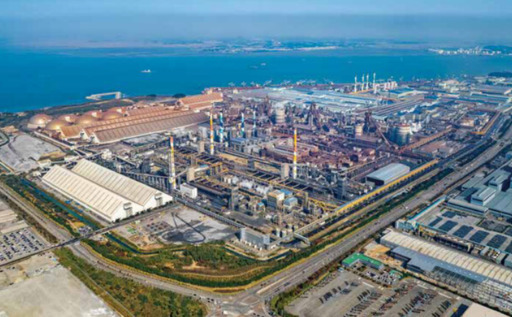


Amidst U.S. President Donald Trump's strong protectionist stance, South Korean companies are focusing on increasing local investments in the U.S. to respond to high tariffs. In an uncertain environment, their strategy is to overcome the crisis by concentrating on local production and building supply chains.
According to industry sources on the 23rd, following President Trump's re-election on the 20th (local time), domestic companies are actively preparing countermeasures in response to the new administration's policies in the U.S.
President Trump announced that starting next month, a 25% tariff will be imposed on all products from Mexico and Canada, and he has instructed a review of existing trade agreements. It is also reported that discussions are underway regarding an additional 10% tariff on Chinese goods. The 10% additional tariff mentioned by Trump would be imposed on top of the tariffs already levied on over $300 billion worth of Chinese imports during his first term.
President Trump also signaled the possibility of imposing a universal 10% tariff on all imported goods. Although he mentioned that the universal tariff policy is not yet prepared and the specific implementation timeline remains uncertain, domestic companies are closely monitoring the potential for such tariffs. Companies without local factories are particularly concerned about the loss of price competitiveness due to the introduction of these tariffs.

◆ "Mitigating Tariff Risks by Establishing U.S. Production Facilities"
The steel industry is actively expanding into the U.S. as the importance of establishing production facilities in the U.S. has grown. South Korea's steel exports to the U.S. are subject to a duty-free quota of up to 2.68 million tons per year. If local production is established, it can reduce tariff burdens and create a more stable supply chain, which is expected to be advantageous in terms of profitability.
Hyundai Steel is reportedly considering building a steel plant in the U.S., attracting attention. Hyundai Steel plans to produce automotive steel products locally in the U.S. and supply them to Hyundai Motor Group's U.S. factories. Hyundai Motor Group operates Kia's plant in Georgia and Hyundai's plant in Alabama. Additionally, Hyundai is constructing a dedicated eco-friendly electric vehicle plant, MetaPlant America (HMGMA), in the Savannah area of Georgia.
The shipbuilding industry is also actively investing in the U.S., focusing on the potential for alliances in shipbuilding and defense sectors. Hanwha Ocean and Hanwha Systems completed the acquisition of 100% of the shares of the Phili Shipyard in the U.S. in December 2024, with an investment of approximately $100 million. Hanwha Group is the first domestic company to acquire a U.S. shipyard.
Earlier, in November 2024, shortly after his election, President Trump mentioned in his first phone call with President Yoon Suk-yeol, "I am aware of South Korea's world-class capabilities in building warships," and added, "It is necessary to closely cooperate with South Korea not only in ship exports but also in the maintenance, repair, and overhaul (MRO) sector."
The power industry is also expected to experience growth in performance, driven by the U.S. market's need to replace aging power infrastructure. President Trump has announced plans to invest over 700 trillion KRW in artificial intelligence (AI). As a result, there is growing optimism that the power equipment sector will benefit from this trend and experience a boom.
HD Hyundai Electric will increase its investment in production facilities for ultra-high voltage transformers in response to growing AI demand and the expansion of data centers. The company plans to invest a total of 396.8 billion KRW in the construction of a new production facility at its Ulsan plant and the establishment of a second plant in Alabama, USA. Through this expansion, HD Hyundai Electric aims to secure production capacity for 756kV (kilovolt) ultra-high voltage transformers, which is the highest voltage specification currently used in the U.S. market.
An industry insider stated, "Domestic companies are increasing investments in the U.S. to avoid tariffs and reduce logistics and distribution costs," adding, "It is essential to turn U.S. protectionism into an opportunity by creating jobs and expanding investments in the U.S." They further emphasized, "Expanding market access in the U.S. and actively utilizing the local ecosystem will be key to strengthening cooperation with the new U.S. administration."
ChatGPT를 사용하여 번역한 기사입니다.


 Copyright ⓒ 메트로신문 & metroseoul.co.kr
Copyright ⓒ 메트로신문 & metroseoul.co.kr
Copyright ⓒ Metro. All rights reserved. (주)메트로미디어의 모든 기사 또는 컨텐츠에 대한 무단 전재ㆍ복사ㆍ배포를 금합니다.
주식회사 메트로미디어 · 서울특별시 종로구 자하문로17길 18 ㅣ Tel : 02. 721. 9800 / Fax : 02. 730. 2882
문의메일 : webmaster@metroseoul.co.kr ㅣ 대표이사 · 발행인 · 편집인 : 이장규 ㅣ 신문사업 등록번호 : 서울, 가00206
인터넷신문 등록번호 : 서울, 아02546 ㅣ 등록일 : 2013년 3월 20일 ㅣ 제호 : 메트로신문
사업자등록번호 : 242-88-00131 ISSN : 2635-9219 ㅣ 청소년 보호책임자 및 고충처리인 : 안대성